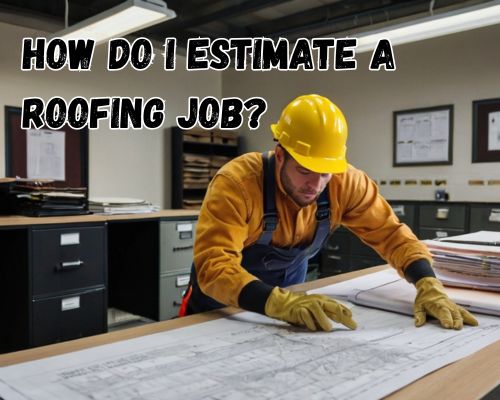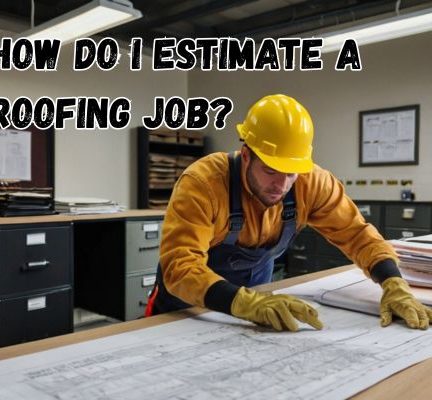When considering a roofing project, one of the first and most important questions that arise is, “How do I estimate a roofing job?” Whether you’re a homeowner in New Jersey looking to repair a leaking roof or planning a full roof replacement, accurately estimating the cost is crucial to understanding what you’re getting into. Proper estimation not only helps you stay within budget but also ensures that you hire the right professionals and avoid unexpected costs down the road.

With Charles Jimerson of CJ Commercial Roofing NJ, we will break down the process of estimating a roofing job, focusing on key factors that influence the cost of roofing in New Jersey. We will also address some common questions, offer insights on the best materials, and provide local references to ensure your estimate is both realistic and accurate.
Factors That Affect Roofing Estimates in New Jersey
Several factors contribute to the overall cost of a roofing project. Each factor plays a role in determining the final estimate and understanding them will help you make informed decisions. Here are the key components to consider when estimating a roofing job in New Jersey.
1. Roof Size and Pitch
The size and slope of your roof are the most obvious factors when estimating a roofing job. Roof size is typically measured in “squares,” with one square equaling 100 square feet of roofing area. To calculate the total square footage of your roof, you can multiply the length and width of each section and then divide by 100.
The pitch (or slope) of your roof also plays a significant role. Roofs with a steeper pitch are harder to work on, and they require more materials and labor to install the roofing system. In New Jersey, many homes have steeply pitched roofs due to weather conditions, which can increase the cost of the job.
2. Roofing Material
The material you choose for your roof will significantly impact the cost. In New Jersey, homeowners have several options when it comes to roofing materials, including:
- Asphalt Shingles: One of the most popular and cost-effective options, asphalt shingles are durable and easy to install. They are the most common choice for New Jersey roofs, with prices typically ranging between $100 and $200 per square.
- Metal Roofing: Metal roofs are gaining popularity in New Jersey due to their longevity and energy efficiency. While they come with a higher upfront cost (usually between $500 and $1,000 per square), they offer long-term savings on energy bills.
- Slate and Tile: High-end materials like slate and tile can cost between $1,000 and $2,000 per square, making them less common in New Jersey but still an option for upscale homes.
- Wood Shingles or Shakes: A traditional choice in New Jersey, wood shingles are both aesthetically pleasing and eco-friendly. They usually range from $400 to $600 per square, but may require more maintenance than other materials.
3. Roof Condition
The condition of your existing roof can also influence the cost of the project. If your current roof is in bad shape and needs extensive repairs or a complete replacement of the decking or underlayment, this will add to the overall cost. New Jersey’s harsh winters, especially in areas like Morristown and Paterson, can result in roof damage such as cracked shingles or water leaks, making the condition of your roof an important factor in estimating costs.
4. Labor Costs
Labor costs vary across New Jersey, depending on the location and complexity of the roofing job. Generally, labor rates in urban areas like Newark or Jersey City may be higher than in more suburban locations like Flemington or Hackettstown. Roofing professionals in New Jersey typically charge between $50 and $100 per hour, depending on the expertise of the crew and the difficulty of the job.
If the roofing job requires additional work, such as installing skylights or chimneys, this will add to the labor costs. For example, roofers may need extra time to install flashings or other custom features, especially if you’re upgrading to a higher-end material.
5. Permits and Local Regulations
Before starting any roofing project, you must ensure that you have the proper permits. In New Jersey, roofing permits are required for most significant roofing jobs, especially those involving a complete replacement or structural changes. Permit fees typically range from $100 to $400, depending on the town or city.
Furthermore, New Jersey has specific building codes that must be adhered to when performing roofing work. Make sure that the roofing contractor is familiar with the regulations in your area. Local municipalities, such as Trenton or Camden, may have their own set of rules regarding roofing materials, installation methods, and safety standards.
How to Get Accurate Roofing Estimates in New Jersey
Getting an accurate estimate requires more than just calculating the size and material cost. To ensure that you are receiving an accurate roofing estimate in New Jersey, follow these steps:
1. Get Multiple Quotes
It’s always a good idea to gather quotes from at least three different roofing contractors. In New Jersey, you can find reputable roofing companies in areas like Cherry Hill or Princeton. Be sure to ask each contractor to provide a written estimate that includes the breakdown of costs, such as materials, labor, and any additional charges. See CJ Commercial Roofing NJ for more.
2. Check Reviews and References
Look for roofing contractors with positive reviews from local customers. You can check platforms like Google Reviews or the Better Business Bureau for feedback from New Jersey homeowners. You may also want to ask contractors for references from past clients to ensure they have experience working in your area.
3. Understand the Scope of Work
Ask for a detailed explanation of the scope of work. A reputable contractor should be transparent about the tasks involved and the materials being used. Be cautious of contractors who provide vague or incomplete estimates. If you live in areas prone to extreme weather, such as Atlantic City, it’s important to ensure that the roofing materials are appropriate for the local climate.
4. Plan for Contingencies
Unexpected costs can arise during any roofing project. It’s wise to budget an additional 10-15% for unforeseen circumstances, such as hidden damage to the roof deck or the need for extra labor.
Conclusion
Estimating a roofing job in New Jersey can seem overwhelming, but by understanding the key factors that influence the cost, you can make a more informed decision. The size, pitch, and material of your roof, the condition of your existing roof, labor costs, and local regulations all play a crucial role in determining the final price.
By gathering multiple quotes, checking references, and thoroughly understanding the scope of work, you can avoid surprises and ensure that your roofing job is completed on time and within budget. Whether you’re in New Jersey’s bustling urban areas or its more rural towns, making the right choices will help protect your home for years to come.
For homeowners in New Jersey, estimating a roofing job with accuracy is the first step towards a successful and cost-effective project. And if you’re ready to get started, don’t hesitate to contact local roofing contractors who specialize in New Jersey’s specific needs and conditions.

